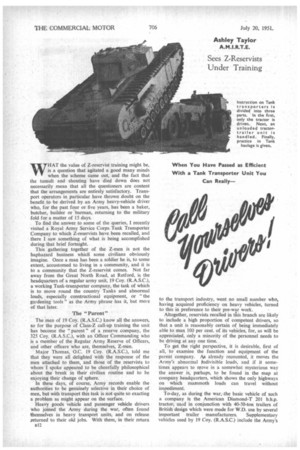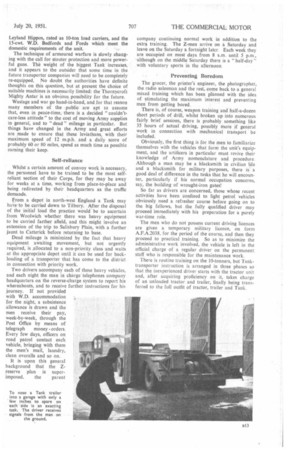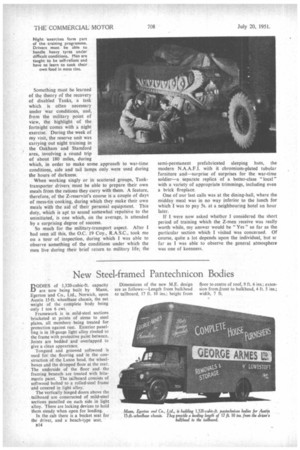Ashley Taylor A.M.I.R.T.E.
Page 46

Page 47

Page 48

If you've noticed an error in this article please click here to report it so we can fix it.
Sees 2-Reservists Under Training
WHAT the value of Z-reservist training might be, is a question that agitated a good many minds when the scheme came out, and the fact that the tumult and shouting have died down does not necessarily mean that all the questioners are content that the arrangements are entirely satisfactory. Transport operators in particular have thrown doubt on the benefit to be derived by an Army heavy-vehicle driver who, for the past four or five years, has been a baker, butcher, builder or barman, returning to the military fold for a matter of 15 days.
To find the answer to some of the queries, I recently visited a Royal Army Service Corps Tank Transporter Company to which Z-reservists have been recalled, and there I saw something of what is being accomplished during that brief fortnight.
This gathering together of the Z-men is not the haphazard business which some civilians obviously imagine. Once a man has been a soldier he is, to some extent, accustomed to living in a community, and it is to a community that the Z-reservist comes_ Not far away from the Great North Road, at Retford, is the headquarters of a regular army unit, 19 Coy. (R.A.S.C.), a working Tank-transporter company, the task of which is to move round the country Tanks and abnormal loads, especially constructional equipment, or "the gardening tools" as the Army phrase has it, but more of that later.
The "Parent"
The men of 19 Coy. (R.A.S.C.) know all the answers, so for the purpose of Class-Z call-up training the unit has become the "parent" of a reserve company, the 325 Coy. (R.A.S.C.), with an Officer Commanding who is a member of the Regular Army Reserve of Officers, and other officers who are, themselves, Z-men.
Major Thomas, O.C. 19 Coy. (R.A.S.C.), told me that they were all delighted with the response of the men attached to them, and those of the reservists to whom I spoke appeared to be cheerfully philosophical about the break in their civilian routine and to be enjoying their change of sphere.
In these days, of course, Army records enable the authorities to be genuinely selective in their choice of men, but with transport this task is not quite so exacting a problem as might appear on the surface.
Heavy goods vehicle and passenger vehicle drivers who joined the Army during the war, often found themselves in heavy transport units, and on release returned to their old jobs. With them, in their return a12 to the transport industry, went no small number who, having acquired proficiency on heavy vehicles, turned to this in preference to their pre-war work.
Altogether, reservists recalled in this branch are likely to include a high proportion of competent drivers, so that a unit is reasonably certain of being immediately able to man 100 per cent, of its vehicles, for, as will be appreciated, only a minority of the personnel needs to be driving at any one time.
To get the right perspective, it is desirable, first of all, to examine the function and equipment of the parent company. As already recounted, it moves the Army's abnormal tndivisible loads, and if it sometimes appears to ruove in a somewhat mysterious way the answer is, pethaps, to be found in the map at company headquarters, which shows the only highways on which mammoth loads can travel without impediment.
To-day, as during the war,■the basic vehicle of such a company is the American Diamond-T 201 b.h.p. tractor; us/x1 in conjunction with 40-50-ton trailers of British design which were made for W.D. use by several important trailer manufacturers. Supplementary vehicles used by 19 Coy. (R.A.S.C.) include the Army's
Leyland Hippos, rated as 10-ton load carriers, and the 15-cwt. W.D. Bedfords and Fords which meet the domestic requirements of the unit.
The technique of armoured warfare is slowly changing with the call for stouter protection and more powerful guns. The. weight of the biggest Tank increases, and it appears to the outsider that some time in the future transporter companies will need to be completely re-equipped. No doubt the authorities have definite thoughts on this question, but at present the choice of suitable machines is necessarily limited: the Thornycroft Mighty Antar is an obvious possibility for the future.
Wastage and war go hand-in-hand, and for that reason many members of the public are apt to assume that, even in peace-time, there is a decided " couldn'tcare-less attitude" to the cost of moving Army supplies in general, and to " dead " mileage in particular. But things have changed in the Army and great efforts are made to ensure that these leviathans, with their maximum speed of 12 m.p.h. and a daily score of probably 60 or 80 miles, spend as much time as possible earning their keep.
Self-reliance
Whilst a certain amount of convoy work is necessary, the personnel have to be trained to be the most selfreliant section of their Corps, for they may be away for weeks at a time, working from place-to-place and being redirected by their headquarters as the traffic demands.
From a depot in north-west England a Tank may hav.e.to be carried down to Tilbury. After the disposal of the initial load the practice would be to ascertain from Woolwich whether there was heavy equipment to be carried farther afield, and this might involve an extension of the trip to Salisbury Plain, with a further jaunt to Catterick before returning to base.
Dead mileage is minimized by the fact that heavy equipment awaiting movement, but not urgently required, is Allocated to a non-priority class and waits at the appropriate depot until it can be used for backloading of a transporter that has come to the district in connection with priority work.
Two drivers accompany each of these heavy vehicles, and each night the man in charge telephones company headquarters on the reverse-charge system to report his whereabouts, and to receive further instructions for his journey. If not provided with W.D. accommodation for the night, a subsistence allowance is drawn and the men receive their pay, week-by-week, through the Post Office by means of telegraph money-orders. Every few days, officers on road patrol contact each vehicle, bringing with them the men's mail, laundry, clean overalls and so on.
It is upon this general background that the Zreserve plan is super imposed, the pa rent company continuing normal work in addition to the extra training. The Z-men arrive on a Saturday and leave on the Saturday a fortnight later. Each week they are occupied on most days from 8 a.m. until 5 p.m., although on the middle Saturday there is a "half-day' with voluntary sports in the afternoon
Preventing Boredom
The grocer, the printer's engineer, the photographer, the radio salesman and the rest, come back to a general mixed training which has been planned with the idea of stimulating the maximum interest and preventing men from getting bored.
There is, of course, weapon training and half-a-dozen short periods of drill, whilst broken up into numerous fairly brief sessions, there is probably something like 35 hours of actual driving, possibly more if general work in connection with mechanical transport be included.
Obviously, the first thing is for the men to familiarize themselves with the vehicles that form the unit's equipment, and the artificers in particular must revive their knowledge of Army nomenclature and procedure. Although a man may be a blacksmith in civilian life and a blacksmith for military purposes, there is a good deal of difference in the tasks that he will encounter, particularly if his normal occupation concerns, say, the building of wrought-iron gates!
So far as drivers are concerned, those whose recent activities have been confined to light petrol vehicles obviously need a refresher course before going on to the big fellows, but the fully qualified driver may proceed immediately with his preparation for a purely war-time role.
The men who do not possess current driving licences are given a temporary military licence, on form A.F.A.2038, for the period of the course, and then they proceed to practical training. So as to minimize the administrative work involved, the vehicle is left in the official charge of a regular driver on the permanent staff who is responsible for the maintenance work.
There is routine training on the 10-tonners, but Tanktransporter instruction is arranged in three phases so that the inexperienced driver starts with the tractor unit and, after acquiring proficiency on it, takes charge of an unloaded tractor and trailer, finally being transferred to the full outfit of tractor, trailer and Tank.
Something must be learned of the theory of the recovery of disabled Tanks, a task which is often necessary under war conditions, and, from the military point of view, the highlight of the fortnight comes with a night exercise. During the week of my visit, the reserve unit was carrying out night training in the Oakham and Stamford area, involving a round trip of about 180 miles, during which, in order to make some approach to war-time conditions, side and tail lamps only were used during the hours of darkness.
When working singly or in scattered groups, Tanktransporter drivers must be able to prepare their own meals from the rations they carry with them. A feature, therefore, of the Z-reservist's course is a couple of days of mess-tin cooking, during which they make their own meals with the aid of their personal equipment. This duty, which is apt to sound somewhat repulsive to the uninitiated, is one which, on the average, is attended by a surprising degree of success.
So much for the military-transport aspect. After I had seen all this, the O.C. 19 Coy., R.A.S.C., took me on a tour of inspection, during which I was able to observe something of the conditions under which the men live during their brief return to military life; the semi-permanent prefabricated sleeping huts, the modern N.A.A.F.I. with it chromium-plated tubular furniture and—surprise of surprises for the war-time soldier—a separate replica of a better-class "local" with a variety of appropriate trimmings, including even a brick fireplace.
One of our last calls was at the dining-hall, where the midday meal was in no way inferior to the lunch for which I was to pay 5s. at a neighbouring hotel an hour later.
If I were now asked whether I considered the short period of training which the Z-men receive was really worth while, my answer would be " Yes " so far as the particular section which I visited was concerned. Of course, quite a lot depends upon the individual, but sc far as I was able to observe the general atmosphere was one of keenness.




















































































